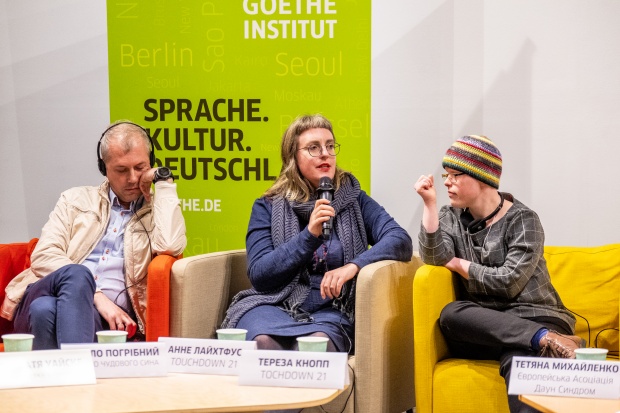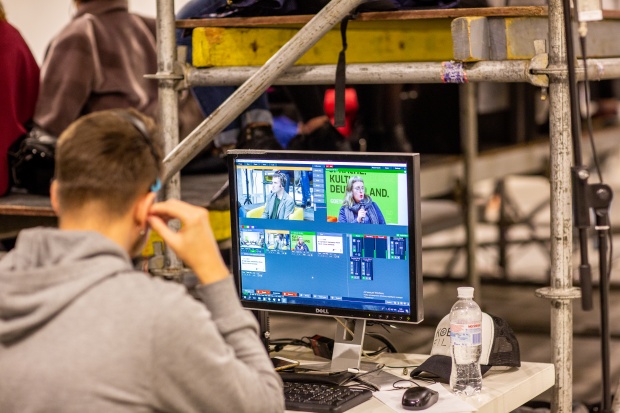
20.10.2018
Couch talk on armchairs
There are many questions regarding Down syndrome. In Germany. In the Ukraine. Around the whole world.
That's why experts sat together in armchairs.
6 experts were a part of the couch talk:
- Pavlo Pogribnyi.
He lives in the Ukraine and has a son with Down syndrome. - Dr. Katja Weiske from the Senckenberg Institute for History and Ethics of Medicine.
She is an expert on chromosomes and genetics. - Teresa Knopp.
She has Down syndrome.
She writes for the Ohrenkuss magazine.
And she is a member of the TOUCHDOWN 21 research team. - Elena Bolshanina.
She is the head of the Ukrainian NGO Down-Syndrome in Kiev. - Tetjana Mychailenko.
She is a member of the board of the Ukrainian NGO Down-Syndrome in Kiev. - Anne Leichtfuß.
She is a member of the TOUCHDOWN 21 research project. - Volodymyr Bryskin.
He is a journalist and was the host of the talk.

The couch talk happened in the exhibition ЩО ВАЖЛИВО [translated:What is Important].
The audience in the hall could ask questions.
For example they asked:
- In Germany, how is the working life of people with Down syndrome?
- What different jobs do they have?
- How can people with Down syndrome in the Ukraine find work?
- Especially in the countryside.
- How can families be supported to accept a child with Down syndrome?
- How many people in Germany decide for or against having an unborn child with Down syndrome, when they find out about it through prenatal testing?
- How are parents told that their child has Down syndrome?
- How does that happen in Germany?
- How does that happen in the Ukraine?
- Are parents in Germany offered the option to send their child with Down syndrome to a special home after its birth?
- Are there people with Down syndrome in Germany who have a drivers license?
- In the Ukraine, how are people with Down syndrome called?
- In Germany how is inclusion going?
- And in the Ukraine?
- What is needed to support teachers to be able to teach well people with Down syndrome?
- How do good school books for people with Down syndrome have to look?
The questions were asked in Ukrainian, Russian, English and German.
Wladimir Schwed translated it all.
During the couch talk, visitors to the exhibition could listen in.
And it was streamed live on the Internet.
4,500 people in Germany and the Ukraine listened to the conversation.

